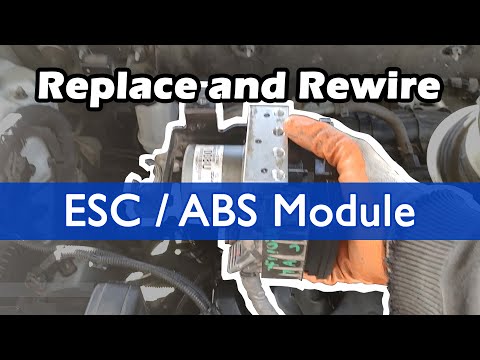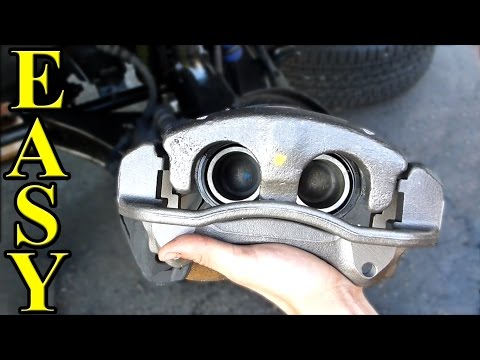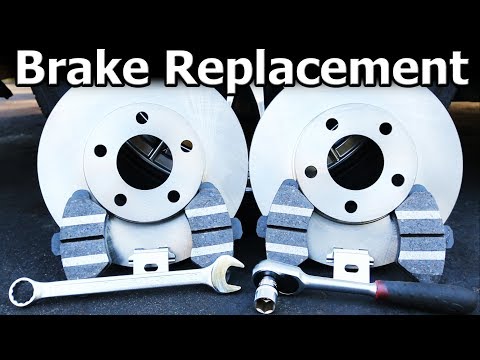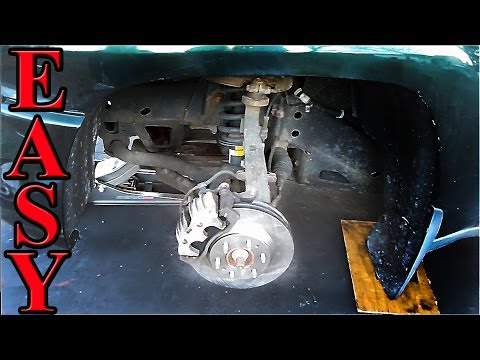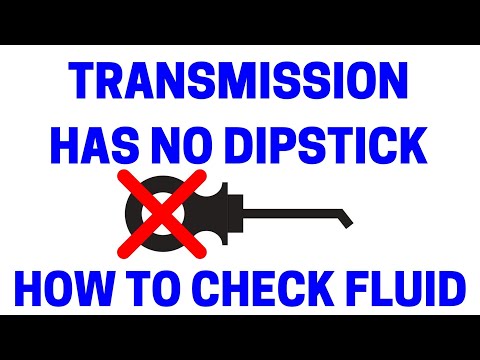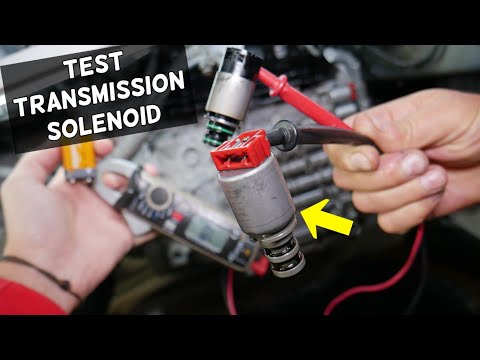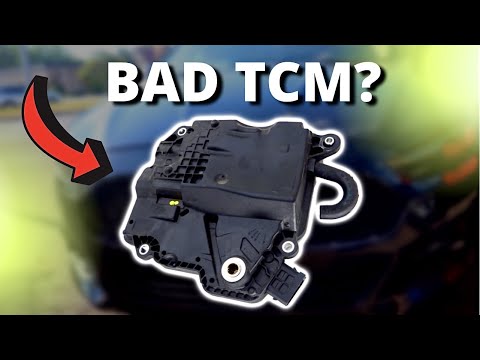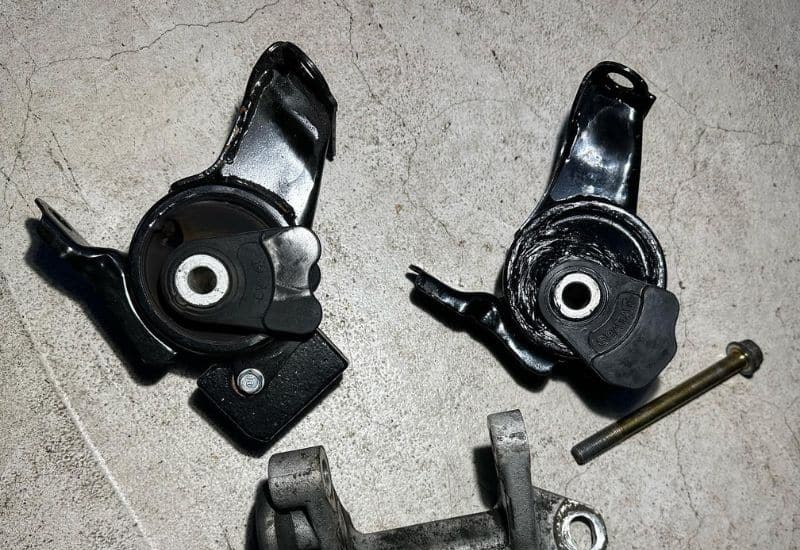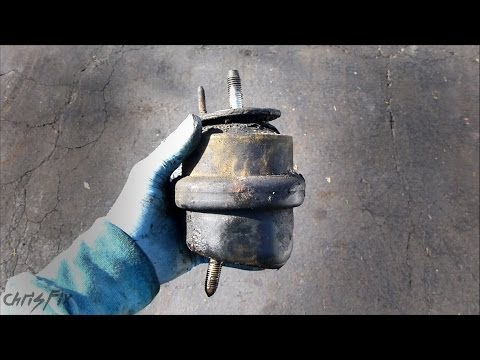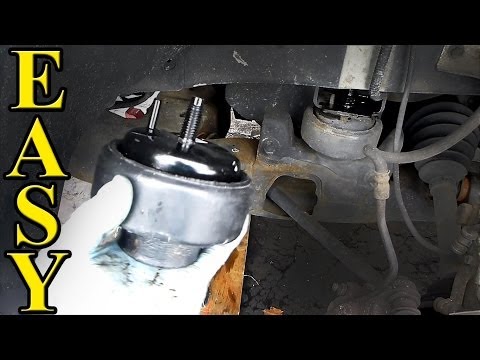
Normally your car is supposed to decelerate smoothly when you step on the brakes. If your car suddenly starts jerking when you step on the brake pedal it might be something minor like the ABS trying to slow you down quickly from highway speed. Though it could also be a more serious sign of a major brake system fault or possibly even a transmission problem.
To get your car to come to a smooth stop again, we need to bring all the possible causes into sharp focus. If you’re lucky, it might be a minor fault with a quick fix. Though a lot of times when a car jerks when braking it’s a symptom of a serious problem that needs to be addressed by a professional mechanic.
How A Car’s Braking System Works
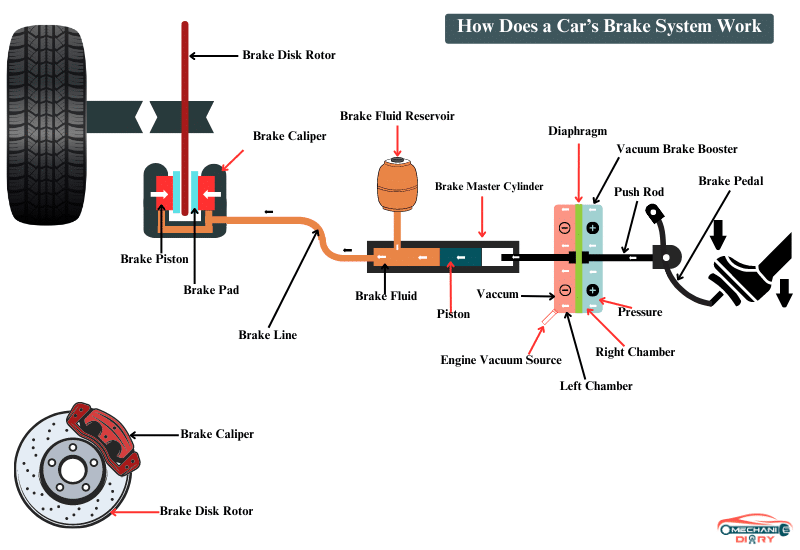
When you step on the brake pedal it activates the brake booster, which amplifies the mechanical force of your foot transmitting it to the master cylinder. Here the mechanical force is transformed into powerful hydraulic pressure which passes through the brake lines to the calipers. They compress brake pads onto the wheel rotors creating enough friction force to slow the car down.
Most modern cars also have anti-lock brake systems (ABS) which measure wheel speed and consider braking force. When the pressure applied by the brake booster and master cylinder reaches a certain threshold the ABS control system pulses the brakes hundreds of times per second to keep them from locking up.
While all this is going on in the brake system, the car’s ECU also throttles down the timing of the engine and reduces the RPMs. The automatic transmission also shudders the force being sent to the wheels as the torque converter starts the process of changing down the gears.
With so many different things happening all at once, a fault in the brake system, the ABS, the engine, or the transmission could cause the car to jerk when you start braking. Though it usually helps to start with the usual suspects.
8 Possible Reasons Why Your Car Jerks When You Apply the Brakes
It can be disconcerting when your car shudders upon braking. This may point to underlying mechanical problems that demand attention. For these major causes, your vehicle might exhibit such behavior when you decelerate:
1. An ABS (Anti-lock braking system) Fault
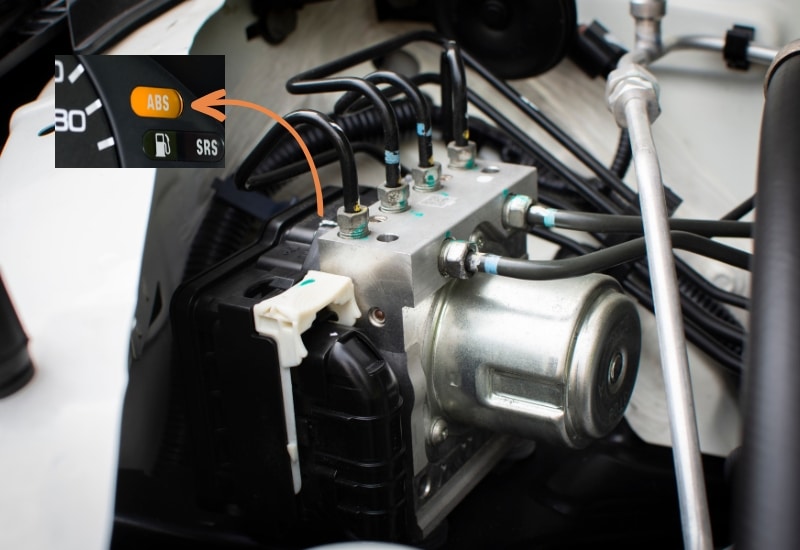
A malfunctioning anti-lock brake system that only activates intermittently can cause the car to jerk rather than gently pulse when you start to decelerate. In a scenario like this a wiring problem, a failure inside the ABS control module, or a fault in the hydraulics is causing the system to turn on and off or send false feedback to the braking system.
In a scenario like this, you’ll usually get an ABS warning light on the dash console. It might come on and stay on or it might flash only when the car jerks, so cast a quick glance at the console when braking.
How to Diagnose
Diagnosing an ABS problem starts with finding, checking, and cleaning the wheel sensors. If one or more of them is caked with road grime, or there’s a loose wire connection it can essentially cause the ABS control module to make bad decisions when braking. If they’re reasonably clean and the wires are firm, then you need to turn your attention to the ABS control monitor.
Hooking up an ABS scanning tool is the easiest way to diagnose a fault in the anti-lock braking system.
Code U0121 might come up to indicate “Lost Communication With Anti-Lock Braking System (ABS) Module.”
Codes C0065, C0070, C0075, and C0080 also indicate a failure in one of the wheel sensors.
How to Fix
If it’s a bad wheel sensor that’s causing your car to jerk hard when braking the sensor itself will need to be replaced. This is in the range of what a capable DIY mechanic can handle. Though a mechanic can usually do it faster and at a minimal cost.
The cost to have a mechanic replace a bad-wheel speed sensor ranges from $65 to $125.
If it’s a bad ABS control module, then it will likely need to be replaced. This is usually beyond what a DIY mechanic can handle, as it requires special tools and calibrations.
The cost to have a mechanic replace a bad ABS control module ranges from $450 to 650.
2. A Loose Brake Pad or Caliper
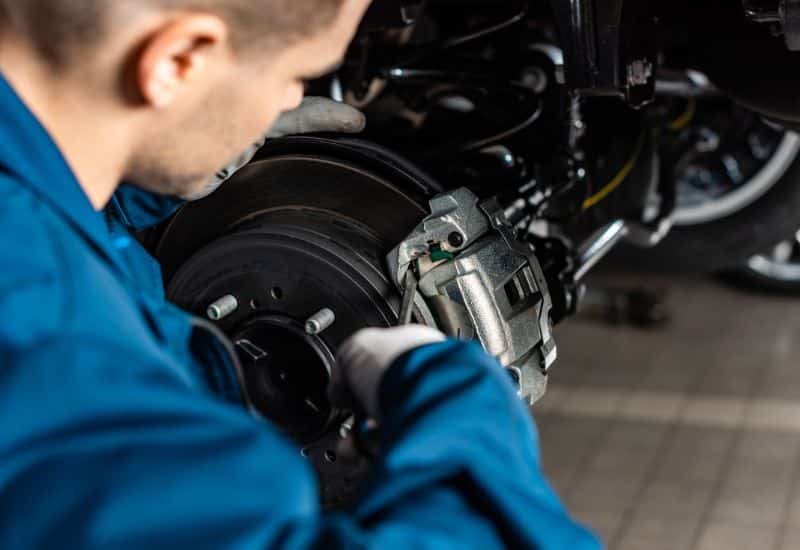
A brake pad that comes loose from the mounting or an unresponsive brake caliper that doesn’t compress on the brake rotor can also cause a car to jerk erratically when braking. In a case like this, you’ll usually feel the car pull to one side when you slow down.
If the pad is loose, comes out of alignment, or has partially broken free from the caliper it will catch sporadically causing the jerking motion. You’ll likely also hear a lot of grinding noises, and you might even notice smoke coming from one wheel.
How to Diagnose
Diagnosing a loose brake pad and/or caliper problem can be a little counter-intuitive. If the car is pulling to one side due to a loose, unresponsive brake caliper. The problem is on the opposite side of the pulling. If the steering wheel is also vibrating as the jerks when decelerating, then it’s likely the front brakes.
If it’s just the caliper that’s failing to respond, and the brake pad is fine, you won’t hear any grinding noise, as there won’t be physical contact with the rotor. Chances are good the brake line is leaking inside the caliper, and you might even notice some drips when you park and pump the brakes with the engine running.
If it’s a brake pad that’s come loose, then you’ll likely hear a “Fingernails on a Chalkboard” type of metal grinding noise. The car will pull for moments to the opposite side of the problem before jerking. This is the pad catching sporadically as it makes momentary contact with the rotor. When this happens you might also hear a clunking sound.
How to Fix
If you catch a loose brake pad immediately, you might be able to get away with the low cost of simply replacing both brake pads on the axle. Don’t give in to the temptation to just replace the one single pad, as this will cause uneven brake wear, and you’ll end up with brake and rotor problems in the not-so-distant future.
Replacing the brake pads is something a capable DIY mechanic can handle. Though chances are good there are other faults in the system that only a trained mechanic can spot.
The cost to have a mechanic only replace the brake pads will range from $120 to $250 per axle.
If it’s a loose caliper, then a mechanic will need to replace the caliper on both sides of the axle. They’ll also correctly recommend that you replace both sets of brake pads.
The cost to have a mechanic replace brake calipers and pads on both sides of the axle ranges from $450 to $800 per axle.
3. Severely Worn or Imbalanced Rotors
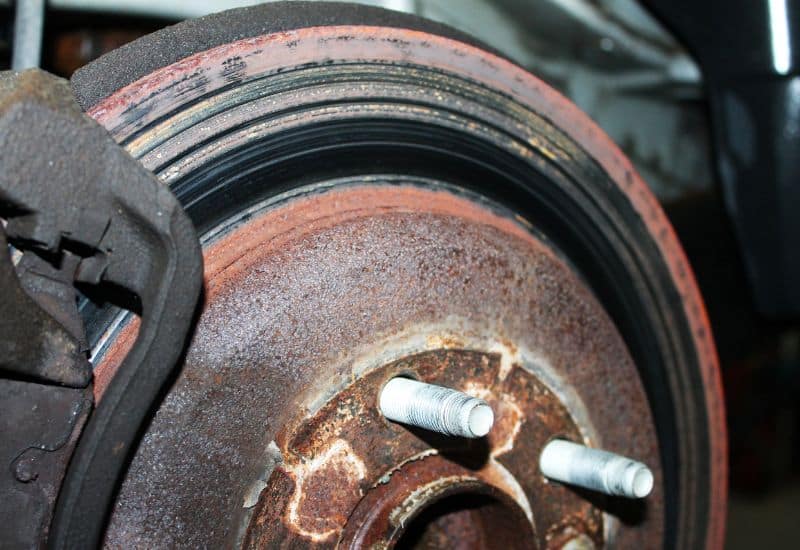
Rotors that are severely worn or imbalanced make inconsistent contact with the brake pads, which can cause hard, sporadic vibrations that feel like jerking or hard shuddering as the car comes to a stop. This goes beyond the vibrations of warped rotors, and your car is definitely not safe to drive until you get the problem fixed.
How to Diagnose
The symptoms of warped rotors, like jerking when braking, pulsating, grinding noises and increased braking distance can sometimes start out minor. Though you’ll notice brake pulsation from badly worn rotors once the brakes have warmed up.
So, it’s almost tricking you as your brakes might seem relatively normal, and maybe just aren’t as responsive when you leave home. Then half an hour into your drive, after some stop-and-go braking the car starts to vibrate a little bit when you brake. Then suddenly starts jerking hard every time you come to a stop.
If it’s the front rotors that are badly warped or imbalanced then you’ll likely notice the steering wheel vibrating. The vibration in the brake pedal will also be more pronounced when you step down hard.
If it’s the rear rotors, the steering wheel won’t have much if any vibration, and you might even feel the jerking motion like it’s coming from the back of the seat. If you have a rear-wheel drive car or truck with bad rear rotors you might also notice the nose dip down as the front brakes are working properly, but the rear drive tires are still trying to push you forward.
How to Fix
Severely worn brake rotors that cause a car to jerk hard when braking will need to be completely replaced. The surface of the rotor is likely too cracked and deformed to be machined or smoothed out with a lathe.
The problem is that severely worn rotors are likely causing major damage to the brake pads and possibly even the brake calipers. Especially if you hear a severe grinding noise when braking, and then a rasping metal sound that persists for 10 to 30 seconds after you set off again.
The cost to have a mechanic replace badly worn rotors ranges from $225 to $500 per axle.
When you add replacement brake pads to the list the cost goes up another $120 to $250 per axle.
If you need total caliper replacement with brake pads and rotors the cost goes up to $650 to $1,100 per axle.
4. Collapsing Suspension
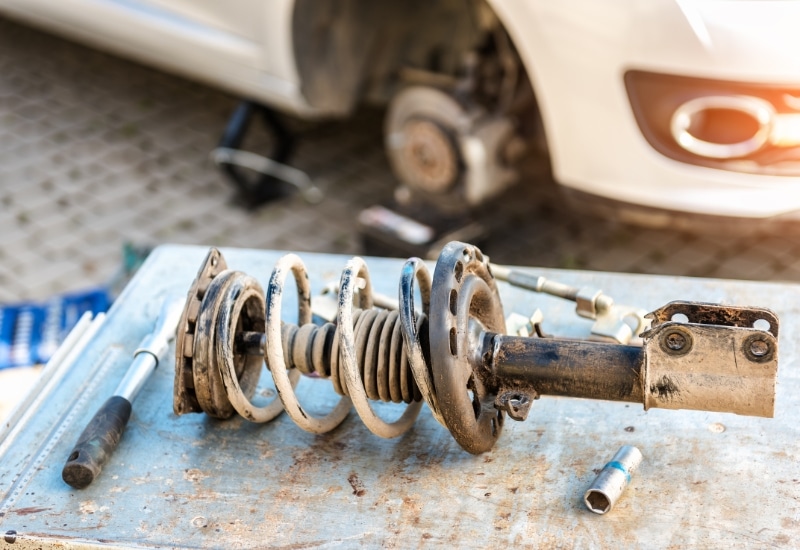
Suspension that has been driven to near the point of total failure affects braking in dramatic ways, including jerking motions, bouncing when slowing, or driving over things like speed bumps. Depending on if it’s the rear or front suspension failing you might also notice that the nose of the car is riding high or your headlights seem to be pointed more at the road than straight in front of you.
How to Diagnose
If you have front struts or shocks that are completely out or nearing collapse you might notice the nose of the car jerking down hard when you step on the brakes to stop short. It might even cause the front tires to kiss the wheel wells, adding to the violent jerking effect for a split second before the nose of the car bounces back up.
If it’s the rear suspension system that’s collapsing, the nose of the car will feel like it’s riding high. People might even flash their “Brights” at you thinking that you’re riding around at night with your high-beam headlights on. If your car’s rear suspension has leaf springs with shackles and hangers that have failed, you might also notice one or both of the back tires occasionally smoking when they kiss the wheel wells.
How to Fix
If you have failing or collapsed suspension components that are causing the car to bounce and jerk when braking, then you need to park the car until you can get the suspension system replaced. This is usually beyond what a DIY mechanic can handle.
The cost to replace completely worn-out struts usually runs between $150 to $400 per strut.
If your car has shocks as well, then they will also need to be completely replaced, which will add another $175 to $300 to the repair costs.
If the reason your car is jerking when braking is due to failed leaf springs the cost of replacement will be around $475 to $750.
If there’s also a failed shackle-and-hanger, but the leaf spring itself is still good, the cost to replace the component and repair the surrounding structure will range from $150 to $300.
5. Low Transmission Fluid
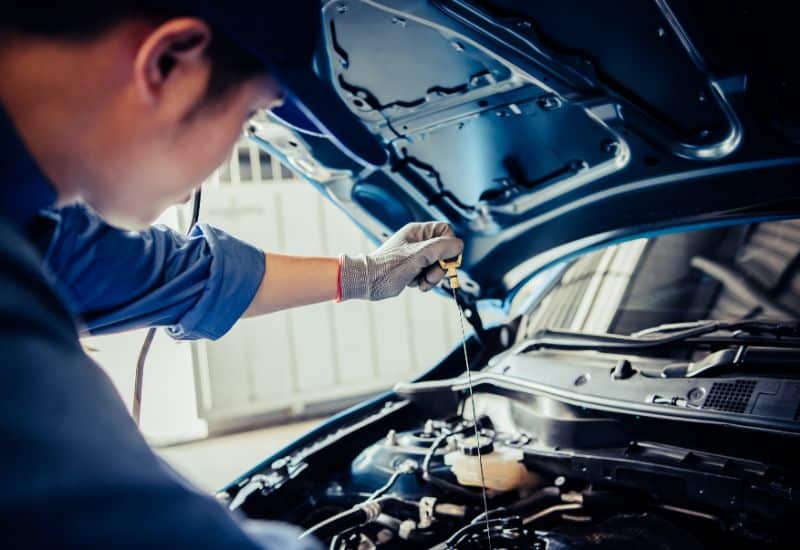
If your transmission fluid is low the car torque converter and other transmission components will struggle to downshift when decelerating causing the car to jerk hard when braking. You might even hear a strange clunk that sounds like it’s coming from the middle of the car near the firewall. This is the transmission finally down shifting into gear and the car lurches with the change in torque.
How to Diagnose
If low transmission fluid is causing your car to jerk or jolt when you step on the brakes then you’ll probably also notice a lot of hesitation in the gear changes. If the fluid is desperately low, you might even hear grinding noises as you drive along or notice it slipping out of gear as it tries to climb the tree.
If your transmission fluid, if it has a dipstick, checking the fluid, is pretty easy. If it looks low, then you know it needs to be topped up. If your transmission doesn’t have a dipstick, you’ll need to check the inspection plug on the side of the transmission. If it doesn’t release any fluid, then you know you’re at least a little bit low.
If you’re lucky the fluid is just low and translucent pink without any metal flecks in it. Though if it’s dark, then the lubricating properties of the fluid have degraded, and you may have suffered transmission damage. If the transmission fluid looks like it has tiny metal flecks in it, the gears have been grinding for a while, and you might have damaged some of the transmission’s many moving parts.
How to Fix
Even if your transmission fluid is perfectly pink and translucent without anything in it, you’re still dealing with a serious leak somewhere in the system. Transmissions don’t burn fluid, and the level should never change on its own.
Check the transmission housing as well as the fluid pan for signs of a leak, as well as the fluid lines that run back and forth to the radiator. Also, check the axle seals and the back side of the drive tires for signs of fluid.
The cost to replace a bad or leaky transmission oil pan gasket ranges from $175 to $350.
The cost to have a mechanic replace your transmission oil pan runs between $350 to $550.
You can usually have a mechanic replace your damaged transmission lines for $125 to $200.
The average cost for an axle seal replacement ranges from $250 to $350.
6. A Stuck Transmission Solenoid
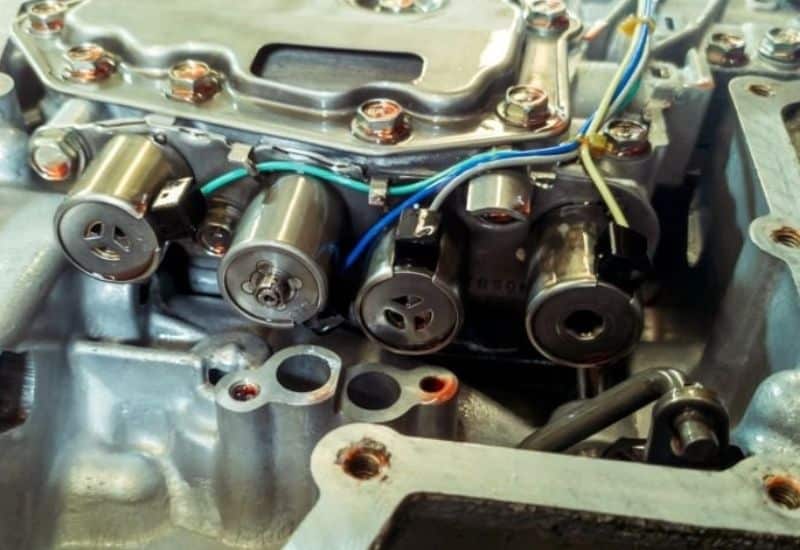
If the shift solenoid in an automatic transmission gets stuck or doesn’t respond to the TCM valve body it can struggle to downshift on time, causing jerking or hard shifts when decelerating. The shift solenoid is responsible for moving pressurized transmission fluid to make the gears and other components respond to the speed and load demand of the engine.
How to Diagnose
A lot of times when a shift solenoid is having a problem it’s due to dirty, degraded, or contaminated transmission fluid. If you check your fluid and it’s dark and/or you see metal flecks of other debris suspended in the fluid, it could easily be affecting the shift solenoid’s ability to properly downshift gears when braking.
Many times a fault like this turn on a check engine or check transmission light. When it does it will throw a code that you can use to determine the root of the problem.
Code P0750 indicates a Shift Solenoid Malfunction, which means the TCM doesn’t recognize the specific RPM range where the transmission should shift.
How to Fix
If it is a bad shift solenoid that’s causing your car to jerk when braking then you usually need a transmission specialist to replace the entire solenoid pack. If the transmission fluid was dark or there were contaminants in it like metal shavings, then the fluid will need to be replaced. If there were a lot of metal shavings suspended in the transmission fluid, you might also need other repairs inside the transmission housing.
The cost to have the transmission solenoid pack replaced averages around $350 to $700.
If it’s possible to just replace the shift solenoid, then the cost can come down to $200 to $450.
7. A Problem with the TCM
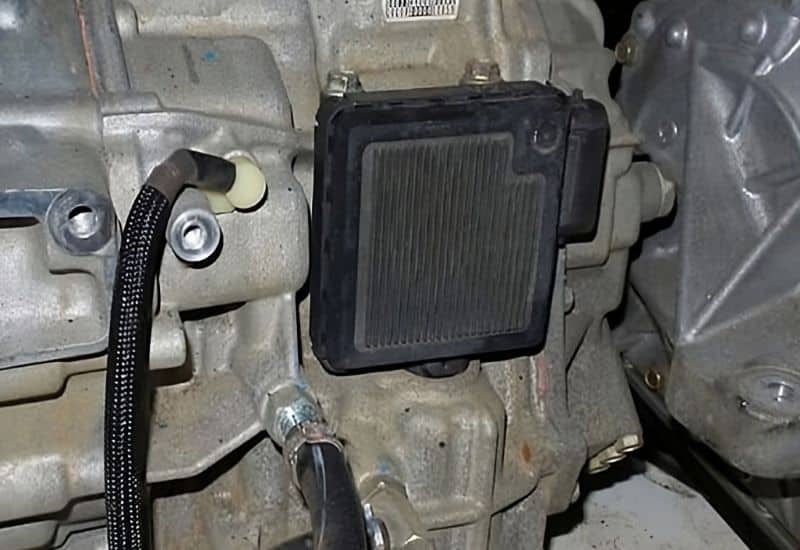
Anytime there’s a fault in the transmission control module (TCM) it can show up as hard shifts and jerking motions when braking. The TCM acts as the brains of the transmission, if it has a fault, or a bad sensor stops relaying critical information to the TCM it can make the wrong gear change or get stuck in gear causing sometimes violent shuddering as the car attempts to decelerate.
How to Diagnose
A faulty TCM will usually struggle with gear changes up and down the tree of gears. This usually includes a lot of hesitation as you try to go from first to second and third. When it gets stuck in a gear it can also cause your car’s average MPG to take a massive nosedive!
A bad TCM can damage the transmission and other drivetrain components. So most automakers set very sensitive thresholds which will turn on a check engine or check transmission warning light. When it does it will also throw a warning code.
In newer vehicles, a bad TCM that causes jerking when braking and other serious shifting problems can trigger the car to go into limp-home mode.
How to Fix
Several things can cause a problem with your TCM. Loose wires and software issues can usually be addressed without having to replace the TCM. Though cracks, internal corrosion, and burned-out components usually mean you need to replace them.
The cost to replace the TCM can vary depending on the shop, and whatever other repairs need to be made. If it’s just a matter of replacing a wiring connection or replacing a faulty sensor that was throwing the TCM out of balance then the repair bill might be around $100 to $250.
To replace the entire TCM, you can expect a repair bill of $375 to $750 for parts and labor.
8. Bad Transmission/Motor Mounts
Bad or worn-out transmission mounts can also cause a clunking sensation and jerking motion when you decelerate. These mounts are made from steel and typically have reinforced rubber or urethane bushings that bolt them to the frame of the car. If these rubber components break down with age or they’re damaged in some way, the transmission won’t be stable.
This can lead to the transmission causing excess vibrations, and heavy clunking sensations when you accelerate or decelerate. It can also struggle to change gears or get stuck in a gear, hesitating to change down when you brake causing a hard jerking motion when it finally does.
How to Diagnose
If you’ve been noticing signs of bad transmission mounts, like vibrations, clunking noises, and sticky gear changes, then you’ll need to perform a visual inspection. You can find where your transmission mounts are for your make and model in your owner’s manual or repair guide.
Look for cracked rubber, the mount feeling loose and the rubber at the edge of the mount looking rotten.
How to Fix
If you’re a fairly accomplished DIY mechanic you might be able to replace your transmission mounts. There aren’t any special tools involved, but you need to strategically place jacks, which might require a professional mechanic’s training. They can also be stubbornly stuck to the frame. While you’re at it, you might as well replace all the mounts, as they tend to fail around the same time.
The cost to have a mechanic replace bad transmission mounts ranges between $250 to $350.
Frequently Asked Questions
Will Worn-Out Brakes Cause Jerking When Slowing Down?
Worn-out brake pads and modestly warped rotors will cause vibrating and sometimes even pulsing. Though it usually requires a much more serious fault in the brake system to cause the brakes to jerk hard or violently shudder the car.
Why Does My Car Jerk Then Come Out of Gear
Jerking when braking and the car dropping into neutral is usually a sign of low transmission fluid. In a scenario like this, there’s so little transmission fluid in the pan that the filter can’t pick up enough to fully pressurize the transmission, and it dumps the fluid as it slips out of gear. You might be able to put it back in gear again only to have it slip out into neutral the next time you brake to a complete stop.
Can I Diagnose a Brake System Problem Myself?
You might be able to interpret the symptoms of a brake system failure on your own. Though it honestly takes a lot of time to make sure you got everything, and if you screw one thing up, it can lead to a brake imbalance causing other brake system damage that puts you back at square one.
The wisest move is to find a shop that does cheap brake inspections. Rapid oil change places that also offer tire rotations can usually perform a professional brake inspection for $50 to $75.
Conclusion
Jerking when you brake is usually related to a brake system issue or a transmission problem. If it’s the braking system, you’ll probably hear grinding noises, brake pulsing, or notice your braking distance has gotten ugly. The car might even pull hard to one side.
The easiest way to get an accurate picture of what’s going wrong with your brakes is to have a professional brake inspection performed. Then you can make informed decisions about what repairs need to be done, and whether you can truly tackle them yourself.
If your car is jerking due to down-shifting problems or a disconnect between the ECU and the TCM, you should start by checking the transmission fluid. If it’s low, you can refill it in small doses.
Just bear in mind that transmissions are sealed systems and if the fluid is low, then you have a leak somewhere. A lot of times, when an obvious transmission problem is causing the car to jerk when braking, the wise move is to take it to a transmission specialist. They can find the leaks and repair them, diagnose the TCM, and help you understand your repair options.

Written By
Jason Farrell
Jason Farrell is a certified master technician, the editor of Mechanic’s Diary in Pittsburgh, Pennsylvania. He is ASE (Automotive Service Excellence) certified and earned a Bachelor’s Degree in Automotive Technology from Pittsburg State University. With nearly 18 prior years of experience in the automotive field, he has extensive knowledge about Domestic, European, and other foreign makes and models of cars and light trucks. Jason’s experience working as a technician and service manager at dealerships, gave him the experience and know-how of most aspects of inspection, diagnosis, and repair from engine and drivability to electrical, HVAC, brakes, steering and suspension and everything in between.

